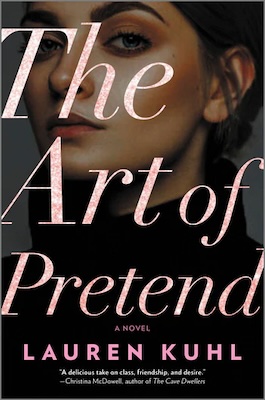There is a reason we consume content about love, and it’s not only because of its relatability. No, I’d argue that love makes us selfish. We are all trying to decipher lovers lost and found, past and present, hoping that someone else’s experience might shed light on our own. We hope that the question of, “What went wrong?” will finally be addressed, or the overdue epiphany might at last descend, like a delayed plane on the runway. See every Taylor Swift album, including her most recent, The Tortured Poets Department, which has me admittedly nostalgic for the series of heartbreaks that punctuated my twenties.
It is no wonder that my debut novel, The Art of Pretend, memorializes this turbulent decade in all its glorious uncertainty and chaos, self-sabotage and desperation. But it wasn’t until the final drafts that I recognized one of its most important themes: toxic relationships.
What, exactly, makes a romantic relationship “toxic?” The qualifications that come to mind range from empty promises, love-bombing, obsession and projection, gaslighting, and, of course, the grand finale of many toxic tête-à-têtes: ghosting. Fun, right? What is perhaps even more fun are the range of emotions following the storm: Crushing disappointment. Grief. Occasionally, rage.
I recall a relationship many summers ago when the object of my own affection played me like a puppet. He would go weeks at a time without contact, only to reach out the exact moment I made peace with his absence, and there I’d go again, following the breadcrumbs he laid out for me to his neatly-laid trap. I remember the fleeting peacefulness when I woke each morning, the few seconds of bliss before all the emotions flooded back and I was forced to pretend I was fine. Work helped, a temporary numbing agent that wore off at six, when I would find myself lurching toward the subway, again joined by the terrible company that was my thoughts. When would the pain subside? And why had I refused to recognize the signs when all my friends already spotted the red flags waving defiantly in the distance? Because before we were bad, we were good, and I subscribed to the idea of us more than reality. Like Ren, the protagonist in my novel, I learned that people aren’t always who they say they are, and eventually, the pain subsided. Summer turned to fall, then winter. His texts no longer lit up my phone like a flare, but rather the tiniest rock in a lake, barely dimpling the surface. Then one morning I woke up and didn’t think of him anymore.
And yet, I wouldn’t change any of it. Despite the pain, toxic relationships are, dare I say, the cornerstone of growing up. They are some of my favorite dynamics to both write and read. So, here are some of my favorite novels that brilliantly memorialize the most toxic relationships we have with others, and occasionally, ourselves.
The Guest by Emma Cline
Early twenty-something Alex skulks around the Hamptons after being thrown out by her much older boyfriend. Taking place over the span of a few days, we watch with bated breath as Alex grifts around the exclusive enclave, inventing stories about herself as various strangers naively welcome her into their lives. Alex takes us on a carousel of toxic relationships, from a fling with an unstable teenager to an ex back in New York who lords something over her. The slow-burn culminates in a pulse-stopping ending that had me sitting in silence afterward, only to start ripping through its pages again.
Sweetbitter by Stephanie Danler
The coming-of-age novel that changed the way I think of coming-of-age novels, I devoured Stephanie Danler’s debut in one sitting. I was twenty-four at the time, embroiled in my own unending roulette of toxic romances, and absolutely captivated by protagonist Tess’s obsession with bad-boy bartender, Jake. Like Ren’s lust for Archer in The Art of Pretend, their relationship is a testament to how love defies logic, and how people do what they want despite the consequences.
Desperate Characters by Paula Fox
Charlie and Sophie are a childless married couple living Brooklyn when one weekend, Sophie is bitten by a neighborhood cat. As Sophie becomes increasingly paranoid that she has contracted rabies, Fox peels back the layers of their seemingly idyllic life. A classic tale of “Everything is not what it seems,” it left me wondering about the secrets we keep and just how little we really know each other.
Luster by Raven Leilani
After being fired from her job as a lowly publishing assistant, Edie moves in with her lover, his wife and their adopted daughter; but a comedy of errors, this is not. Leilani masterfully crafts realistic characters in a stunning narrative about love, art, race and class. Edie’s identity as an artist living in fear of her own self-doubt is also beautifully rendered and painfully relatable.
Yellowface by R.F. Kuang
A page-turner that is both a thriller and darkly funny commentary on the publishing industry, Yellowface explores the dynamics of a contentious friendship whose obsession extends beyond the grave. This was my favorite read of 2023, and I know I’m not alone. I simply couldn’t put it down.
The Idiot by Elif Batuman
Selin is a freshman at Harvard pining for her older classmate, Ivan, in this account of, “Will they, won’t they?” that is both tender and laugh-out-loud funny. What is not funny? Just how slowly the egotistical Ivan gaslights our green protagonist, leading her on as she accepts a summer teaching position in Hungary, in part to be closer to him. This one is for anyone who has ever invented a thousand excuses for their delusional antics—Batuman nailed it.
My Year of Rest and Relaxation by Ottessa Mosfegh
A privileged and depressed twenty-seven-year-old woman decides to sleep for a year in this story set against the looming backdrop of the September 11th attacks. During moments of lucidity, she reflects on grief, her lame existence in New York, and an on-and-off relationship with a Wall Street banker-type who feels more rooted in fact than fiction. But their situation-ship is just one small piece of this ultimately moving novel that addresses what it truly means to be alive. I get chills every time I read the ending.
Heartburn by Nora Ephron
It wouldn’t be a list about toxic relationships without Heartburn. Ephron’s sole novel, Heartburn is a loosely fictionalized account of the writer’s own marriage, which dissolved due to her husband’s affair, while she was pregnant with their second child, no less. But this being a creation of Ephron, she will make you laugh with her one-of-kind wit, only to punch you in the gut with raw emotion when you least expect it.
Read the original article here

